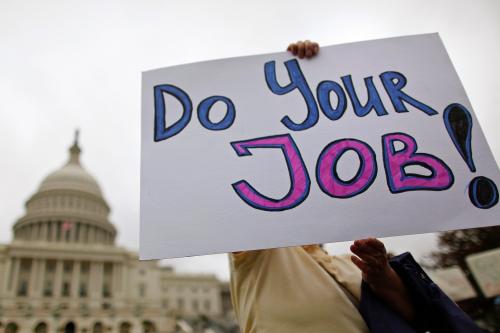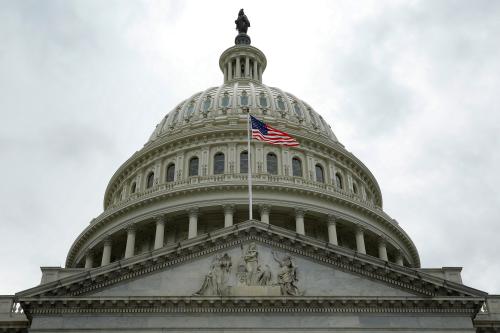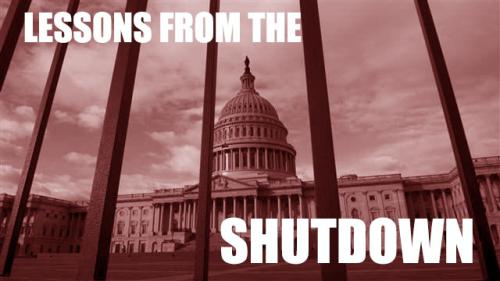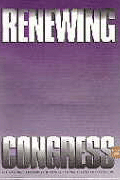With the prospect of a budget shutdown weighing down on Washington, D.C., citizens and members of Congress would do well to read just one section of the recently released report by the nonpartisan Partnership for Public Service. It is called “Government Disservice” and moves beyond the politics of a government shutdown to highlight the far reaching and damaging consequences a shutdown poses for the executive branch. The findings are not pretty. Congressional budget inaction cripples the executive branch. While a government shutdown is most often decried because of the loss of taxpayers’ hard-earned money, this report highlights the blow sustained by departments and agencies across the executive branch, resulting in declining productivity, innovation and morale, to name just a few consequences.
Let me state at the outset that I fully understand that narrow margin politics, heightened political polarization and the emergence of the Tea Party have complicated even the best efforts in Congress to compromise. I am not naïve to the pressing electoral needs in Congress, the siren call of big donors who relish the ideological mud-slinging, or the permanent campaign ethos that pervades our government. All of the aforementioned undermine and devalue the critically important functions and responsibilities of the U.S. Congress. However, the fact remains that threatening to shut down the government, let alone actually shutting it down, severely harms executive branch operations in both the short and long term. “Government Disservice” provides a much needed look at the concrete ways in which a shutdown harms the federal government, and heightens tension between the branches.
As a contributor to the Partnership’s report, I participated in interviews with a broad swath of the Washington community: Republicans, Democrats, current and former federal employees, political appointees, former members of the House and Senate, Capitol Hill staff and scholars (pp.39-41). We deliberately spoke with individuals from the legislative and executive branches in order to understand both sides of the proverbial equation. Setting aside their different career perspectives and likely political differences, the common denominator was deep frustration with Congress. Note that some of these interview subjects had moved on to the private sector, but remembered the pain of a potential government shutdown as though it had happened yesterday. A former EPA official captured the essence of the problem when he described the repeated inability of Congress to fulfill budget responsibilities as “debilitating” (p.23).
Most executive branch officials recounted tales of tremendous disruption, adversely affecting five critical aspects of government operations: productivity, planning, innovation, morale and recruitment. The overarching climate of uncertainty hangs over the government like a wet blanket inhibiting important tasks like planning, innovation and recruitment. For example, executive branch officials must suspend contracts when they are not certain they can pay the providers. Contract suspension often means that stakeholders no longer receive critical services, and renewing contracts often comes along with an additional expense. Hiring is often frozen, leaving vacancies and more work for existing staff members. Civil servants who actually enjoy their government work are told to stay at home and are prohibited from checking email or otherwise doing any government work. Oh, and by the way, you may or may not get paid for the shutdown days. It should not be surprising that the nine government shutdowns since 1981 have worn down dedicated federal employees (p.20). Long-term recruiting efforts become even more difficult as it becomes nearly impossible to lure recent college graduates or others into an institution whose work has been suspended for an unknown time period. And, according to former Director of the U.S. Patent and Trademark Office, David Kappos, “You do nothing new. You’re on life support. You do not innovate at all” (p.23). In short, the mere threat of a shutdown decreases productivity, stifles planning, inhibits innovation, lowers morale and undercuts recruitment. These consequences affect every aspect of running the government, and in some cases, international interests.
Practically speaking, the mere mention of a budget shutdown sparks numerous meetings, memos and subsequent OMB reviews of contingency plans—an enormous checklist to work down in preparation for the government closing, plans that divert resources (work hours and funding) from agencies’ missions. Compounding problems further, once Congress decides to end the shutdown, federal employees must reverse the checklist to get the government up and running again, an effort that also incurs costs. Needless to say, such wheel-spinning derails the regular business of governing, resulting in an even heavier workload once the budget crisis is resolved. And unlike members of Congress who think they have fulfilled their duty once they have reached agreement, the executive branch is adversely affected before, during and after a shutdown. In short, well after Congress moves on to its next public debate or election, the executive branch is still recovering from shutdown chaos.
Having conducted numerous elite interviews throughout my career, this set felt at times like a therapy session—as many talented, thoughtful and dedicated government employees (current and former) expressed unfettered frustration, speaking in starkly negative terms about Congress and the deteriorating relationship between the two branches. And moving beyond the concrete consequences, many lamented a shutdown’s overall impact on the citizenry. According to former congressman and Secretary of Agriculture, Dan Glickman, “Shutdowns contribute to the belief that the system of government isn’t working, and that’s really harmful” (p.21).
Of course, blaming Congress is clearly not the solution, but drawing attention to the long-lasting and deleterious consequences of a shutdown may encourage members to think twice. I say this in a decidedly tentative tone, recalling an interview with former Senator Byron Dorgan (D-ND), who admitted that some members of Congress understand the consequences, but “just don’t care” (p.21). Perhaps the stark examples presented in the Partnership’s report will change some minds on Capitol Hill. It never hurts to try.
The Brookings Institution is committed to quality, independence, and impact.
We are supported by a diverse array of funders. In line with our values and policies, each Brookings publication represents the sole views of its author(s).











Commentary
Shutdowns break government… and its workers
September 28, 2015